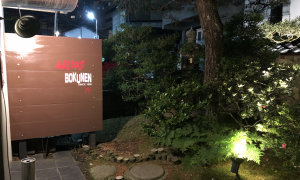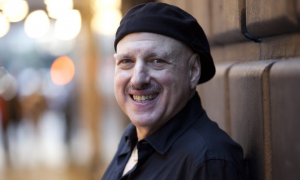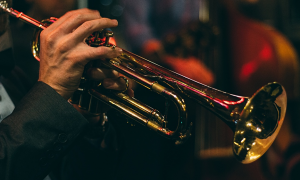Home » Jazz Articles » The Jazz Life » A Professional Jazz Musician? Really? What's That?
A Professional Jazz Musician? Really? What's That?

A professional jazz musician is someone who makes their living spreading their love of and commitment to getting others excited about jazz. It's about being an ambassador for the music. For me, being a professional jazz musician is about helping to sustain a community.
—Kelly Green
A case in point: I've known one booker (who also plays) for years, ever since he was a student of a close friend . Whenever I see him at his gig, he promises to give me a spot on his gig roster down the road, but never responds to my emails (which he asks me to send him as reminders). I get the passive aggressive, "go-forth-and-multiply" non-response, though it took me a while to figure it out. Why not just simply be honest and say, "Sorry, I hate how you play," or "I just don't want to hire you." Is it really better to ignore someone that contacts you, rather than find a nice way of saying, "I'd rather book a Tiny Tim impersonator than you (though I don't mean that in a bad way)?" I have to say "no" to people all the time in my day job but do my best to treat them with the dignity of a response, regardless of the quality of their work.
Another example: I recently had a number of conversations with a promoter whom I've known for years but never worked for. In my other life as a writer and editor, he has asked for my help several times with things that he and his clients want to do in the book world. He also knows that I play and he works regularly with a musician friend of mine. I mentioned that I'd like a shot at a gig at a venue he hosts, and he immediately brought up the thorny problem of how much money he'd make putting me on the bill. A reasonable concern: can I bring in people? I can, though certainly not the crowds that major artists can draw. But not everyone he books is in that league either. I asked about working with a friend whom he often hires who will draw people in. He said that might work. My friend was certainly willing to do the gig, and playing with him is always a gas, so it seemed like a win-win. Perhaps not, as it turned out.
I emailed the promoter saying that I was pretty sure I had fixed the audience problem. He wrote back to say "[I am] only hiring artists who . . . do only one thing, play music. I have no interest in booking an amateur guitarist, even if you can play well. . . . I am cherry-picking only the best musicians in the world.''
I have no issues with someone choosing not to book me if they're honest about it, because that's the nature of the beast and I made my peace with it years ago. But "amateur guitarist?" I've paid my dues, both in apprenticeships with some serious people that I've studied with one-on-one as well as with people I've played with over the years. The idea that I could be snarkily dismissed as not being a real jazz musician (by a non-musician) because it wasn't the only thing I do to make a living touched a nerve.
Defining a professional artist as someone who makes a living by ONLY creating his or her art is, to my mind, arbitrary and shortsighted. Some jazz musicians do earn a living just doing gigs, but frankly they're not all great players and their gigs are often not where most musicians would choose to play. Loud, acoustically horrible restaurants where no one is listening to the music for example. These players have learned to give a performance that is usually consistent because it's the same every time: same tunes and same licks, sometimes filled with "look at me" pyrotechnics, which quickly get boring to listen to because, deep down, the musicians are frightened to skate on the thin ice of on-the-spot creativity everyone strives for in a performance. It is called "improvisation," remember? It's creativity. You're going to get wet sometimes. Deal with it. Sometimes you're going to pirouette and soar! Revel in it. An equal number of writers and musicians have other sources of income besides their art but still create terrific music and books. Are they not professionals? Surely, the mark of being a professional is simply that someone is good enough to get paid for what they do when they do it, not whether or not they make a living at it?
Being straight with someone in an industry as subjective as the arts is at least a respectful acknowledgment of their professionalism, if not their playing (or whatever it is they do). Anything else is condescending and childishly spiteful. Of all the professional jazz musicians I know and know of, a hardy few actually earn a living just by playing real jazz, and are often on the road many months throughout the year as a result. When you're young and single, that's cool. As you get older and want to settle down with a family, it becomes a tougher part of the job. At one point in his career

Warne Marsh
saxophone, tenor1927 - 1987

Ted Dunbar
guitar1937 - 1998

Ted Greene
guitar1946 - 2005

Sal Mosca
piano1927 - 2007

Billy Bauer
guitar1915 - 2005
Jimmy Wyble
guitar, electric1922 - 2010

Spike Wilner
pianoBut the promoter's comment also got me thinking: What is a professional jazz musician these days? What does it take to become one?

Kelly Green
piano and vocals
Christian McBride
bassb.1972

Peter Bernstein
guitarb.1967

Jim Hall
guitar1930 - 2013

Lou Donaldson
saxophone1926 - 2024
I was lucky enough to do a couple of short tours as a young player and wish I had done more. During a two-week tour of England with a jazz swing quartet with
Claude Williams
b.1908
Jay McShann
piano1909 - 2006

Charlie Christian
guitar, electric1916 - 1942
When he isn't performing or recording,

Larry Koonse
guitar, electric
Chuck Berghofer
bass, acousticb.1937

Pete Jolly
piano1932 - 2004
In the mid '70s, the great guitarist Sean Levitt, son of drummer
Alan Levitt
b.1932
Bill Evans
piano1929 - 1980
I had a taste of that world, like a kid briefly allowed to sit in the restaurant and only allowed to have an appetizer but not a real meal, and it left me envious. But the people I played with and befriended in London like

Dave Cliff
b.1944
Bobby Wellins
saxophone, tenor1936 - 2017

Peter Ind
bass, acoustic1928 - 2021

Junior Cook
saxophone1934 - 1992
For
Nate Brown
bass, electricJazz guitarist " data-original-title="" title="">Brent Vaartstra agrees. As well as performing, he devotes a lot of his time to his website, Learn Jazz Standards. "If someone wants to become a professional jazz musician today, they need to think outside the box. . . . [and] cobble together multiple revenue sources in order to make it a full-time job, and only a very small percentage are able to make a comfortable living actually performing, especially if [they're] doing [that] exclusively. Generally, there's an element of education in the mix of revenue streams (such as private lessons, teaching at an institution, music books, online courses...etc). [As an example, even though I'm a player] I make my living almost entirely off of my jazz education website, which is a blog, podcast and YouTube channel."
Nate Brown
bass, electricBrent agrees, "Talent alone will not allow you to 'make it' in the industry [these days]. I know tons of uber-talented musicians who struggle or simply aren't making ends meet at all. Musicians need to invest in themselves, set aside the instrument a little bit, and learn about marketing and business. These are topics I find many musicians (especially jazz musicians) are clueless [about]. Musicians are natural entrepreneurs, many just don't know it."
Larry Koonse agrees with their assessments. "To make a living in today's world, students need to contend with the multi-faceted nature of what it means to be a musician in our society. Purists that neglect musical situations that are out of their zone are likely to not thrive. I play in all sorts of acoustic based situations: singer/songwriter, Brazilian, 20th century classical music with improvisation (such as

Billy Childs
pianob.1957
Or, you do what I and a number of other professionals do. You choose a life that balances playing and practicing with other things that help pay the bills enough so that you can continue to engage in what you love to do most and have invested blood, sweat, tears and years into trying to master, with just enough social media engagement to let people know you're out there, but not enough to fall into the trap of narcissism that social media can lay for us if we're not careful. It's a tough balancing act.
What do you think?
https://soundcloud.com/peter-rubie/grooveyard
Tags
The Jazz Life
Peter Rubie
Warne Marsh
Ted Dunbar
Ted Green
Sal Mosca
Billy Bauer
Jimmy Wyble
Kelly Green
Peter Bernstein
Lou Donaldson
Jim Hall
Jay McShann
Charlie Christian
Larry Koonse
Chuck Berghofer
Sean Levitt
Bobby Wellins
Comments
PREVIOUS / NEXT
Support All About Jazz
 All About Jazz has been a pillar of jazz since 1995, championing it as an art form and, more importantly, supporting the musicians who make it. Our enduring commitment has made "AAJ" one of the most culturally important websites of its kind, read by hundreds of thousands of fans, musicians and industry figures every month.
All About Jazz has been a pillar of jazz since 1995, championing it as an art form and, more importantly, supporting the musicians who make it. Our enduring commitment has made "AAJ" one of the most culturally important websites of its kind, read by hundreds of thousands of fans, musicians and industry figures every month.






 Buy Now
Buy Now























